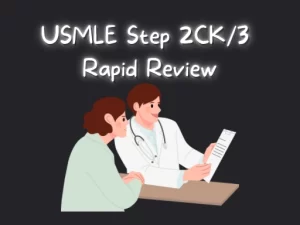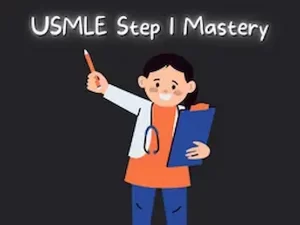When preparing for the USMLE, it’s not just about how much you study—it’s about how smart you practice. The right USMLE practice questions can transform your preparation, helping you think like the examiners and master high-yield concepts under pressure. In this guide, we’ll explore the best question banks and strategies trusted by top scorers to truly boost your prep. Let’s dive in.
USMLE Practice Question Format
Understand how USMLE exam questions are structured across each step to sharpen your preparation approach.
- Step 1: This step emphasizes foundational sciences like pathology, physiology, and pharmacology. The USMLE exam questions are multiple-choice and test your ability to apply basic science concepts to clinical scenarios, often involving patient cases or lab results.
- Step 2 CK: Questions in this phase focus on clinical knowledge and diagnostic reasoning. Each item presents a patient scenario where you must interpret findings, recommend investigations, or determine the next step in management, closely reflecting real clinical decision-making.
- Step 3: This final step includes two parts—multiple-choice questions and computer-based case simulations (CCS). The format evaluates not just knowledge, but your judgment in long-term patient care, requiring timed responses and a structured clinical thought process.
Top USMLE Question Banks
These top-rated platforms offer high-quality USMLE practice questions designed to mirror the exam experience and build clinical reasoning skills.
- USMLE Strike: Tailored specifically for Indian medical students, USMLE Strike offers handpicked USMLE test questions that align closely with real exam patterns. The platform emphasizes high-yield concepts, includes concise explanations, and integrates teaching from experienced USMLE mentors who understand the IMG journey.
- UWorld: Widely considered the gold standard for USMLE prep, UWorld’s question bank focuses on clinical relevance and detailed explanations. Each question mimics the actual exam interface and provides in-depth rationales with diagrams and tables to reinforce core topics.
- AMBOSS: Known for its integration of a vast medical library with an intelligent Qbank, AMBOSS helps students study in context. Features like “highlight mode” and performance analytics allow for efficient review and targeted improvement across all systems and disciplines.
- Kaplan Qbank: Kaplan’s questions are slightly more detailed and theoretical, ideal for those who need to strengthen foundational understanding. The explanations are exhaustive and often paired with mini-lectures or references to reinforce learning.
- USMLE-Rx: Created by the authors of First Aid, USMLE-Rx offers excellent integration with the textbook. Its questions are simpler than UWorld’s but are useful for early-stage learners who want to reinforce high-yield facts and basic test-taking strategies.
- Lecturio: This Qbank combines video lectures with practice questions to offer a guided learning path. It’s particularly helpful for visual learners and those who benefit from structured explanation videos linked directly to each question topic. The platform integrates USMLE test questions with concept-based video teaching, enhancing long-term retention.
- BoardVitals: This platform provides questions that are closer in difficulty to the actual exam and includes strong biostatistics and ethics coverage. It’s a solid choice for final-phase review and for strengthening weaker areas identified late in preparation. The USMLE test questions here are known for their realistic format and analytical depth.
USMLE Strike’s Recommended Practice Strategy
| Strategy Step | Description |
|---|---|
| Begin with System-Wise Practice | Tackle one organ system at a time (e.g., cardiovascular, GI, neuro) to build interconnected knowledge and improve recall for system-based questions. |
| Follow the Learn-Practice-Revise Cycle | Study core concepts, solve related USMLE practice questions, and revise weak areas using trusted resources like USMLE Strike or Kaplan Notes. |
| Use Timed Blocks from the Start | Practice with 40-question timed blocks to mimic exam pressure, enhance time management, and reduce test-day anxiety. |
| Review Explanations Thoroughly | Analyze all answer choices—correct and incorrect—to build stronger clinical reasoning and minimize repeat errors. |
| Track Weak Areas Using Performance Data | Log recurring mistakes and misunderstood topics to tailor your study plan and give more time to weak areas. |
| Schedule Weekly Self-Assessments | Do one custom or NBME-style self-assessment per week to build confidence, spot gaps early, and adapt to varied question formats. |
Sample USMLE Practice Questions from USMLE Strike
These carefully curated USMLE practice questions reflect the level of clinical reasoning, integration, and decision-making expected in the real exam.
Step 1 – Pathology
Question: A 22-year-old man presents with hematuria, periorbital puffiness, and hypertension two weeks after recovering from streptococcal pharyngitis. Urinalysis reveals RBC casts, and renal biopsy shows hypercellularity and immune complex deposition on electron microscopy. What is the most likely diagnosis?
Answer: Post-streptococcal glomerulonephritis.
Explanation: This is a classic presentation with nephritic syndrome following a streptococcal infection. The presence of RBC casts and immune complex deposits confirms the diagnosis.
Step 1 – Biochemistry
Question: A 4-year-old child presents with developmental delay, seizures, and a musty body odor. Laboratory studies reveal elevated phenylalanine levels. Which enzyme is most likely deficient?
Answer: Phenylalanine hydroxylase.
Explanation: The child has phenylketonuria (PKU), an autosomal recessive disorder due to a deficiency of phenylalanine hydroxylase, leading to toxic accumulation of phenylalanine.
Step 2 CK – Internal Medicine
Question: A 60-year-old male chronic smoker presents with fatigue, weight loss, and chronic cough. Imaging reveals a central lung mass. Lab tests show hyponatremia with low serum osmolality. What paraneoplastic syndrome is most likely?
Answer: Syndrome of inappropriate antidiuretic hormone secretion (SIADH).
Explanation: Small cell lung carcinoma is often associated with ectopic ADH production, leading to SIADH, characterized by dilutional hyponatremia and low serum osmolality.
Step 2 CK – Pediatrics
Question: A 3-year-old boy is brought in with a harsh, barking cough and inspiratory stridor. He has low-grade fever and rhinorrhea. What is the most appropriate initial management?
Answer: Administer nebulized epinephrine and corticosteroids.
Explanation: This presentation is consistent with viral croup. Nebulized epinephrine provides rapid relief of airway obstruction, while corticosteroids reduce inflammation.
Step 3 – Ethics
Question: A 45-year-old man with a life-threatening abdominal aneurysm refuses surgery, citing religious beliefs. He is fully alert and competent. What should the physician do?
Answer: Respect the patient’s decision and document the refusal.
Explanation: Competent adults have the right to refuse treatment, even life-saving ones. The physician’s role is to inform and support, not to coerce.
Step 3 – Emergency Medicine
Question: A 25-year-old woman is found unconscious with shallow breathing, pinpoint pupils, and a heart rate of 48 bpm. What is the immediate next step in management?
Answer: Administer intravenous naloxone.
Explanation: This clinical picture suggests opioid overdose. Naloxone is an opioid antagonist that rapidly reverses respiratory depression.
Mistakes to Avoid While Practicing
Practicing USMLE exam questions the wrong way can lead to poor retention and low scores.
- Skipping Explanation Reviews: Many students rush through practice blocks without thoroughly reviewing rationales. This reduces the chance to learn from errors and fully understand the underlying concept.
- Neglecting Timed Sessions: Practicing untimed questions can give a false sense of confidence. The real test requires managing stress and speed under time pressure.
- Ignoring Weak Areas: Focusing only on strong topics is a common trap. Targeting weaknesses is what boosts overall performance and scores in the long run.
- Overloading with Multiple Qbanks: Jumping between too many resources creates confusion and shallow understanding. Depth matters more than volume when mastering clinical reasoning.
Tips to Maximize Practice with the USMLE Strike
Make the most of USMLE Strike’s platform by approaching practice with strategy and focus.
- Customize Blocks by Topic: Build question sets around weak areas such as pharmacology or infectious disease. This targeted approach improves retention and helps close specific knowledge gaps.
- Use the Pause-and-Reflect Method: After answering a question, pause to reflect on your reasoning—whether right or wrong. This habit deepens learning and trains your brain to think critically under pressure.
- Integrate Notes with Questions: Use USMLE Strike’s annotation tools or keep a separate notebook for important takeaways. Reviewing this personalized resource boosts revision and reinforces high-yield concepts.
Conclusion
Practicing quality usmle practice questions is key to strengthening your exam skills and confidence. USMLE Strike offers focused questions that mirror real exam challenges, helping you improve effectively. Avoiding common errors and consistent practice leads to better results. Many students achieve success by following this approach. Begin your focused practice with USMLE Strike to boost your prep and excel.





